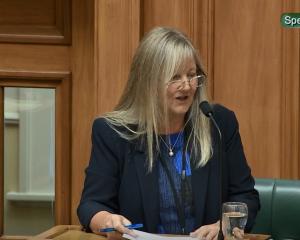
However, employers have backed the plan, saying it "has merit" and warrants "careful consideration".
Labour finance spokesman David Parker announced this morning that a Labour-led government will require the Reserve Bank to use changes to the rate of people's compulsory KiwiSaver contributions rather than interest rates to control inflation while taking pressure off the over-valued kiwi dollar.
Mr English said the variable savings rate idea was "nothing new".
"You can increase the KiwiSaver contribution rate and we did just 12 months ago. If you want to dampen consumption you can also put up tax rates or the Government can spend less."
Mr English said Labour and the Greens were fighting the perception that in Government they would tax and spend more which would push up interest rates.
"So they've floated something they might investigate which they say would fix everything but the end result is you have to save more. It will hit low and middle income households particularly hard. He's not committing the Government to saving more and it would allow a Labour Greens Government to spend a lot more if it worked."
However he was sceptical it would work.
"KiwiSaver is a long term scheme where people need as much certainty and security as you can get... monetary policy focuses on the price of credit. They are both designed for their own specific purpose both have been successful. They both create challenges but there's no evidence that mixing the two of them up is going to somehow give us a magic pudding we've never seen before."
Plan has merit - employers
However the Employers and Manufacturers Assocation said Labour's proposals "have merit and warrant careful consideration, particularly as the Reserve Bank's independence would be preserved".
"Apart from our investment in housing, we're constantly told we're poor savers, and our exporters certainly deserve a better priced dollar - this policy prescription addresses both of these fundamental issues," EMA chief executive Kim Campbell said.
"What's more, New Zealanders would keep their added savings rather than see them disappear when interest rates rise. It could work out well in the longer term."
But while the variable savings rate was a good idea, "it would not be a good idea to allow politicians to determine what it should be".
Furthermore, Mr Campbell said the proposal rested on KiwiSaver being made compulsory, "an idea whose costs may fall unfairly on small businesses".
Labour unveils Kiwisaver plan
Parker unveiled the policy at an Auckland breakfast briefing this morning.
"Instead of paying more interest on your mortgage, under the new rules a similar amount of extra savings would go into your KiwiSaver," he said.
"Overall interest rates will be lower and so will our exchange rate" through use of the Variable Savings Rate(VSR), which a policy paper published this morning says will be "investigated" and from which low income earners may be exempted.
"The policy targets agreement will request that the Reserve Bank use this once in a lifetime opportunity to attempt to get underlying (as opposed to cyclical) New Zealand interest rates back to the lower levels charged in our competitor countries," said Parker.
"The PTA would state whether or not it was the government's expectation that over the economic cycle the Reserve Bank variations to the KiwiSaver rate would be neutral."
Labour would also shift the RBNZ's inflation targeting to include achieving current account surpluses to reverse 40 years of the country living beyond its means.
"If New Zealand is to decrease its net international liabilities and do better in growing per capita incomes (particularly for low and middle deciles), greater priority will need to be given to achieving growth in its foreign exchange earnings or saving sectors."
Parker said "nowhere currently" used a VSR system, but that moving all New Zealanders into compulsory KiwiSaver at an increased rate of contribution would reduce inflationary pressure during the transition phase anyway.
"This is the perfect time to do this," he said.
Labour would raise the current 6 per cent contribution rate to 9 per cent (paid 50/50 by employee and employer) over time. The rates at which a VSR might be set are not discussed, although limits to the extent of variation in savings rates might be part of the PTA.
The RBNZ would not have the ability to deploy the VSR unilaterally. It would have to recommend its use to the government and require agreement on a case by case basis.
"Higher interest rate payments are lost to the lender, with much of it heading overseas, whereas savings would belong to the saver," Parker said.
To reflect a new emphasis on improving the country's external accounts, the Reserve Bank Act would be amended to "maintain stability in the general level of prices in a manner which best assists in achieving a positive external balance over the economic cycle."












